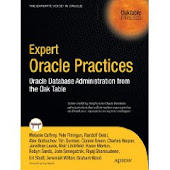Saturday, November 19, 2016
DOAG 2016 - "Oracle Database Cloud Performance" presentation material
Thanks to all attendees that came to my presentation "Oracle Database Cloud Performance" at the DOAG conference 2016. You can check the presentation material here at Slideshare.
Labels:
Conference,
DOAG,
Presentation
Monday, November 7, 2016
Oracle Database Cloud (DBaaS) Performance Consistency - Part 7
This part of the series is supposed to cover the results of I/O related tests performed on the Amazon RDS Oracle cloud instance.
As mentioned in the previous part of this series I've only used the "General Purpose SSD" storage type since the "Provisioned IOPS" storage was simply to expensive to me and it wasn't possible to get a trial license for that storage type.
Now one key aspect of the "General Purpose SSD" storage offered by Amazon RDS is that it is limited to a peak IOPS performance of 3.000 IOPS, and this peak performance will be delivered only for a limited amount of time if you happen to have storage allocated less than 1.000GB - more details can be found on the Amazon RDS documentation.
So in my case since I did a comparison to the Oracle Cloud setup with just 100GB of storage allocated this configuration was only capable of sustaining the peak performance of 3.000 IOPS for a maximum of 2.000 seconds, which is a little more than 30 minutes.
After that the IOPS rate gets limited to the base rate, which in my case here was just 300 IOPS.
Effectively this meant with that configuration I could simply not perform the same I/O heavy tests reasonably - each loop iteration would have taken hours, and then again I didn't plan to run the tests for a very long time since it would simply become too expensive.
To give an idea how running the same test setup would have performed on this Amazon RDS "General Purpose SSD" storage, here is the individual thread performance for the "read-only" I/O test (for details see this blog post, at the end of that post you can also find the median runtimes for the Oracle Cloud DBaaS offering):
So after using up the "I/O credits" for the peak IOPS performance, which is still 10 times slower than the IOPS rate of the Oracle Clould DBaaS offering (approximately 640 seconds per iteration vs. 64 seconds, 3.000 vs. 30.000 IOPS), the rate drops to 300+ IOPS, meaning loop iteration runtimes of 4.500+ seconds - this more than one hour! to run a single iteration of the test that takes slightly more than a minute on the Oracle Cloud DBaaS offering.
I stopped the I/O tests there since I didn't see a point in continuing this further - the two offerings simply can't be compared on that basis. It would have been different when using the "Provisioned IOPS" storage configuration, but that was simply too expensive for such a small test.
Labels:
DBaaS,
Oracle Cloud,
Performance
Wednesday, November 2, 2016
"Cost Based Optimizer: Grundlagen – mit Update für Oracle 12c" Artikel (German)
Seit gestern steht auf der "Informatik Aktuell"-Seite mein Artikel "Cost Based Optimizer: Grundlagen – mit Update für Oracle 12c" zur Verfügung.
Er stimmt auch inhaltlich auf meinen Vortrag bei den IT-Tagen 2016 am 13. Dezember ein.
Sollte Sie das Thema interessieren, lade ich Sie hiermit also herzlich zu meinem Vortrag ein, bei dem ich das Thema auch mit Live-Demonstrationen vertiefen werde.
Subscribe to:
Comments (Atom)


